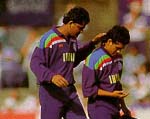Does one laugh or cry?
 R Mohan
R Mohan
 The eminent thespian Sivaji Ganesan used to sing on screen a song
the lyrics of which revealed the feeling that while some laughed
and other cried, the hero felt like laughing and crying at the
same time. There is probably no better sentiment to describe the
situation Indian cricket is in now with an old and wise captain
displacing a young and confused skipper.
The eminent thespian Sivaji Ganesan used to sing on screen a song
the lyrics of which revealed the feeling that while some laughed
and other cried, the hero felt like laughing and crying at the
same time. There is probably no better sentiment to describe the
situation Indian cricket is in now with an old and wise captain
displacing a young and confused skipper.
Making captains play musical chairs is not necessarily an Indian
monopoly. The selectors of many nations agonise so often over
their choice of captain that they are generally not very contrite
after chopping and changing the cricketer at the head of a team.
A switch in captaincy happens often enough across the boarder,
too, to suggest there might be something of an Asian bug to this.
It is an accepted credo that two wrongs do not make a right and
yet the elevation of Mohammed Azharuddin and the displacement
of Sachin Tendulkar is an acceptable compromise.
Given the way his own batting performance was dragged down, the
young man may not have failed to realise the significance of his
appointment. Where he failed was in man management. As the pre-eminent
cricketer in his team he never suffered from the complex of having
to talk his betters into performing well. What he could not attain
was that combination of strategy on the field and management of
people and events off it which made effective and popular captains.
Ian Chappell told me once that the secret of his success was that
while he gave his men 100 per cent backing off the field he expected
them to give him the same on it. One of the well known skippers
who never lost a Test series in his career, the elder Chappell
was the inspiring kind who led his team in a wholesome way but
without running too tight a ship.
Sachin somehow did not seem to be able to draw the best out of
his men and the Indian team under him was beginning to resemble
a collection of individuals some of whom were obviously more talented
than the others but who did not always show it in their performance.
They appointed him when he was a little too young to recognise
fully what an Indian team really needed -- a strong skipper who ruled
with an iron hand and who normally had his way in the selection
committee. Azharuddin was, however, far from being a strong personality
as a skipper.
Azhar is so laidback he would make David Gower seem an hyperactive skipper. The secret of his success -- and he had a lot of
it as the record book anoints him as the country's winningest
captain -- was his great adaptability and his ability to draw the
best of ideas from the very many who willingly advised him.
Sachin was too self willed. It's fine to be a pre-eminent cricketer
who knows his own mind and acts according to it. Regardless of
whether you are your man or not, if you succeed no one is going
to say a word. But because of that minor form of bigotry, he became
too inflexible in strategy.
And because of his failure as well as that of his team, the selectors
not only denied him the one or two players he wished to have in
his squad but lately also began to dictate what the batting order
would be. Things came to such a pass that Sachin should have seen
the signs but then you do not expect a young man with a future
ahead of him to take such a negative step as to step down.
As someone who believes strongly in destiny, Azhar must have anticipated
that he would be back in favour again. The selectors who were
so patient with him in his early days when India seemed to lose
everything were not found to be so strong in their backing of
Sachin. The character of the selection committee has changed some,
and, unfortunately, not for the better.
Why Azhar's appointment is the best and most acceptable compromise
is because there is really no one better qualified to lead India
at the moment. It may be a fond wish but it is to be hoped Azhar
will be at the helm until he himself sees the signs and feels
the time has come for him to relinquish the job and seek retirement.
R Mohan
|